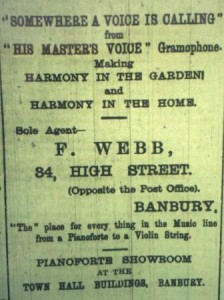Neithrop Station, Tuesday, March 18
(Before Colonel Rothe, in the chair, and Mr. L. W. Stone)
A SHORT-TEMPERED PLOUGHMAN. Thomas Boswell, carter, Mollington, was charged with ill-treating a horse by beating it with a stick there on the 6th of March. Defendant pleaded guilty. P. C. Baker stated that on the date named, at 10.45 in the morning, he was on the highway at Mollington, and he saw the defendant ploughing with two horses in a field. He saw the defendant beat one of the horses ten or twelve times with a stick (produced). The horse was standing quite still when he struck it. He started the horses across the field and afterwards he went to the defendant and asked him why he was beating the horse, and also asked him where the stick was he had been beating it with. Defendant swore, and told him to go and find it. Defendant said he could not get the horses along. Witness went back and found the stick in one of the furrows. Defendant came to him on Sunday and asked him not to report the case. He then admitted he had beaten the horse most unmercifully. He told the defendant that he had one or two complaints previously about him doing the same thing. Defendant worked for Mr Arthur Boddington. The Clerk – Did he lose his temper with the horse? Witness – I can’t say. He beat the horse whilst it was standing perfectly still. The horse he was beating was not in the furrow. Rupert Henry Roberts deposed he was on the Banbury Road in Mollington on the day in question, and he saw Boswell in charge of a pair of horses at plough, between ten and eleven in the morning. When witness saw him he was beating one of the horses with a stick. He turned the horses around, and went on ploughing up the field, and then he started thrashing the horse again. By Inspector Finch – So far as I could see the horses were working quite well. In answer to the Clerk, the witness said he saw the defendant thrash the horse several times, and this was, in his opinion, quite unnecessary, because the horses were working quite satisfactorily. He saw him beat the horse ten or twelve times. Defendant did not beat the horse so hard the second time as witness thought he saw the policeman was looking. Defendant had no questions to ask the witnesses. His defence was that one of the horses was very stupid, and he lost his temper, and brought a stick and struck him. He was very sorry now he had done so, and it would never happen again. The Chairman – Is there anything known about the defendant? Inspector Finch – I saw his employer, and he gives him a very bad character. The Clerk – You must only tell us what you know from your own knowledge. Inspector Finch – I was only replying to the question put to me as to what was known of him. The Chairman addressing the defendant, said he had pleaded guilty to the offence, and he must pay a fine of 5s. and costs, 11s. 6d. Defendant paid the money.
Banbury Guardian, March 1915
